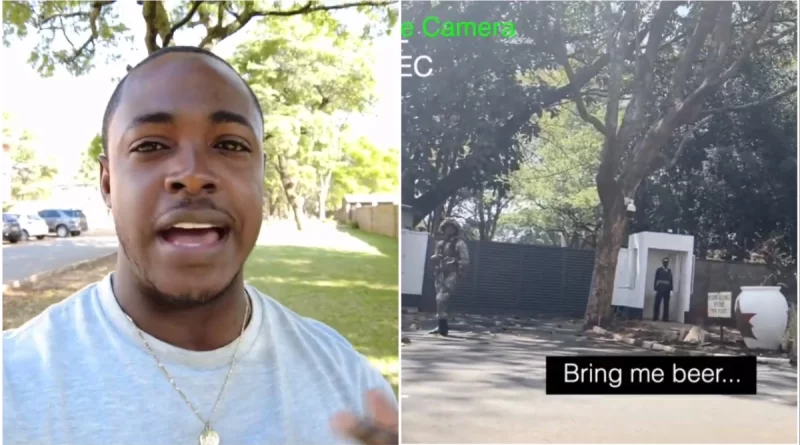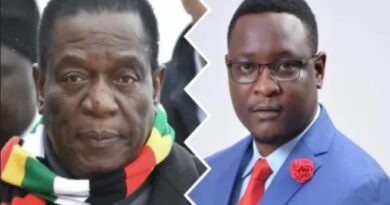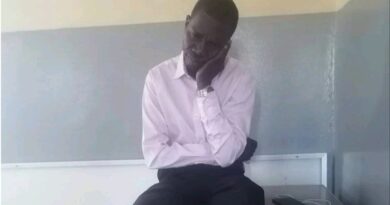Soldiers On State House Guard Beg For Alcohol From Stranger
Join our whatsapp news group:
https://chat.whatsapp.com/CsEtKeo2sOgGjpsfRVGO8o
A viral video showing members of the military’s elite Presidential Guard guarding State House revealing their meagre salaries while begging for low-cost potent vodka from a man, who appears to be a foreigner, is the latest evidence that all is not well in the barracks where most soldiers overwhelmingly voted against President Emmerson Mnangagwa during the 23 and 24 August elections.
In the astonishing footage, a man who appears to be recording secretly, asks the elite soldiers how much they earn, to which they say US$170. They then proceed to beg the man to buy them alcohol and when he asks their preferred brew, they say “Russian Bear,” a cheap alcoholic spirit largely consumed by street youths and downtrodden citizens.
The man goes to buy it at a local supermarket and the soldiers appear excited as they thank the man for his generosity.
Since the 2017 military coup, the rank and file has complained that conditions of service have deteriorated in the face of devastating economic hardships and unfulfilled promises made during the military campaign to remove the long-time ruler Robert Mugabe.
Members of the Zimbabwe Defence Forces were promised improved working conditions, including better pay cheques, but this has not materialised. If anything, the situation has deteriorated.
Senior army officers are also said to be unsettled over their exclusion from running the recently held elections. A Central Intelligence Organisation shadowy group known as Forever Associates Zimbabwe covertly took over the running of the elections from the military which put Mnangagwa in power in 2017.
In the 23 August elections, the voting pattern at polling stations at some army barracks showed that the troops were overwhelmingly against Mnangagwa.
In Redcliff constituency, the Zimbabwe Electoral Commission set up a polling post at an open space in Rutendo near the Pondoroza Barracks, which was exclusive for soldiers from the camp. Sources said military personnel openly had refused to vote inside the cantonment area as they feared they would vote for Mnangagwa under duress.
Tent A was for Redcliff constituency’s ward 1. According to the results pasted at the polling station, Chamisa got 511 votes, while Mnangagwa got 213. At the same Tent A polling station, the CCC parliamentary candidate Lloyd Mukapiko polled 443 votes, beating his Zanu PF rival July Moyo who got 282 votes, showing soldiers also voted for the opposition.
There were two other makeshift polling booths set up for the civilian voters at the same location where, again, Mnangagwa fared dismally against Chamisa. In Tent B, Chamisa got 362 and Mnangagwa 110, while in Tent C, Chamisa polled 422 votes while Mnangagwa received 106.
This pattern was repeated at many polling stations around the country, according to electoral sources.
In February, MPs in the previous Parliament cornered Transport minister Felix Mhona, who at the time was the acting leader of government business in the National Assembly, and outgoing deputy Finance minister Clemence Chiduwa over an unfulfilled promise made to the military in 2020 for the construction of garrison shops inside the barracks to ensure soldiers got access to low-priced basic goods, including foodstuffs.
In a post-cabinet media briefing in Harare on 26 February 2020, Finance minister Mthuli Ncube said cantonment shops would enable army personnel to be “issued with a card or credit limit to buy what they want monthly”.
At that time, Zimbabweans, particularly civil servants, were enduring one of the worst economic crises characterised by acute shortages of fuel, electricity, foreign currency and basic goods such as maize-meal and cooking oil.
However, up to now, the promise has not been fulfilled, leading to the current disgruntlement in which members of the armed forces also feel betrayed after helping Mnangagwa to topple Mugabe.
“The recent elections gave us new and more insight in relation to President Mnangagwa. Firstly, he remains unpopular by a huge 10% gap compared to Zanu PF, his own party. Second, soldiers voted against him in various places and on postal ballots. Third, he got less votes in 2023 compared to 2018 in real or hard numbers by over 100 000 votes. Fourth, in electoral terms there was no consolidation on his part. Fifth, last but not least, the message from the party and the soldiers as voters is that they have no confidence in him. If his party and soldiers lack confidence in him, then he is in serious trouble,” one security official told The NewsHawks.
“In the final analysis, this means he won but he has big problems which will crystalise and unfold in months ahead. His party has no full confidence in him. The soldiers are unhappy and restless. He has also sidelined the army and replaced it with Faz, which has created tensions within the military. Sadc has rejected his re-election. He is isolated now compared to 2018. These are serious issues which can’t be ignored.”
Manipulated elections are not the best indicator of a leader’s popularity and stability. For instance, after elections in Gabon, on 30 August 2023, a dramatic turn of events unfolded as the military staged a coup, seizing control of the nation.
This upheaval followed controversial elections in which deposed President Ali Bongo secured his third consecutive victory.
The coup leaders made a public appearance on state television, where they announced the dissolution of state institutions and the complete closure of borders. In addition, Bongo found himself placed under house arrest.
The military declared General Brice Clotaire Oligui Nguema, the former head of the presidential guard, as the president of the transitional committee tasked with leading the country during this period of instability.
In response to these events, hundreds of people took to the streets of the Gabonese capital, Libreville, to celebrate the military’s intervention.
However, the international community, including the United Nations, the African Union, and notably France, the former colonial ruler of the country, strongly condemned the coup, which the people are supporting.
Military coups were a regular occurrence in some parts of Africa in the decades after independence. Now, after a period of relative democratic stability and Zimbabwe’s November 2017 putsch, they are on the rise again.
Zimbabwe set a wrong precedent, according to former Nigerian president Olusegun Obasanjo. The takeover in Gabon is just the latest in a string of coups that have taken place in recent years, and came just a month after soldiers took control in Niger.
In 2022, there were two coup attempts in Burkina Faso, as well as failed coup attempts in Guinea Bissau, The Gambia and the island nation of Sao Tome and Principe.
In 2021, there were six coup attempts in Africa, four of them successful. *NewsHawks*



